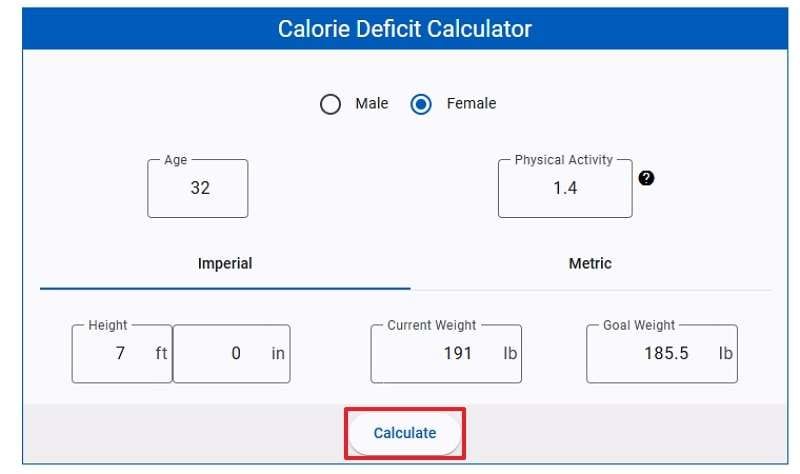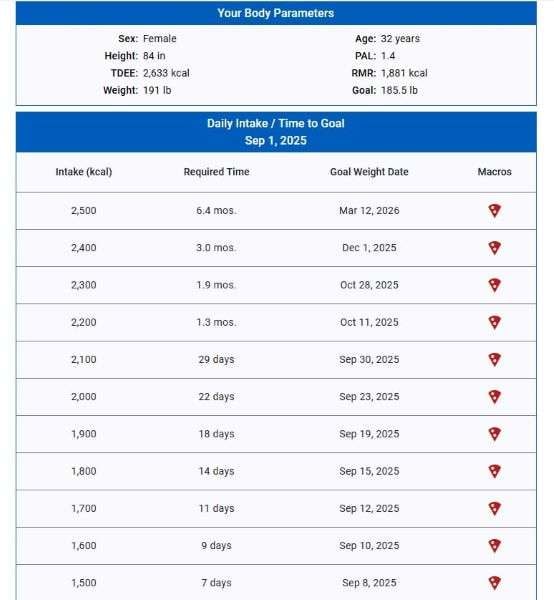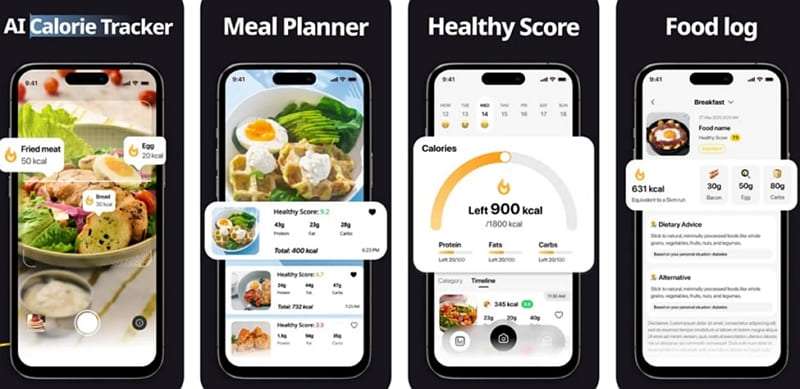Imagine the feeling of trying out different diets, cutting carbs, or skipping meals, yet the scale remains the same when you step on it. It's stressful until you know weight loss isn't about complicated restrictions but a straightforward principle: a calorie deficit formula. Instead of guessing how much to eat or feeling guilty after every meal, this formula gives you a more personalized roadmap.
Now, gain confidence in your venture towards a healthier lifestyle by reading the article below and learn about the actual science behind it. Therefore, stop starving yourself and explore some essential tips to stay on track with the science of nutrition.
In this article
Part 1. Calorie Deficit Formula: The Science Behind It
The literal science behind the formula for calorie deficit is when the number of calories consumed from food is less than the calories expended by the body. This deficit forces the body to consume stored fat as an energy source, leading to weight loss over time. It's the process of energy balance, where a calorie intake that exceeds usage results in weight gain, and if expenditure surpasses intake, weight loss occurs.

Here, the principle is not to restrict you from certain foods or trends, but rather to adapt to your lifestyle and preferences. Knowledge about how many calories you burn daily (TDEE) and adjusting your intake accordingly creates a safe pathway to fat loss. This science-backed approach guarantees you lose weight while fueling your body with nutrients it needs for long-term health.

Part 2. Calorie Deficit Formula: How to Calculate Your Maintenance Calories
To understand the calorie deficit formula for weight loss, you need to know how much weight is sufficient for you and the calories required to achieve that. For this, many calorie deficit calculators like FatCalc work on Basal Metabolic Rate (BMR) and Total Daily Energy Expenditure (TDEE) for calculation. To explain, BMR is the bare minimum your body needs to keep vital functioning, and TDEE reflects your daily calorie needs.
The BMR varies for both men and women, which can be calculated through the provided formulas:
For Men: BMR=10×weight (kg)+6.25×height (cm)−5×age (years)+5
For Women: BMR=10×weight (kg)+6.25×height (cm)−5×age (years)−161
To put into action, explore the tutorial provided and calculate the calorie deficit to reach your desired goal:
Step 1. Access the main page for FatCalc, enter your details regarding "Gender,” “Height,” “Current Weight,” and “Goal Weight.” Once done, press the “Calculate” button to reveal your calorie deficit with respect to the data.

Step 2. Now, examine your results and for each decrease in units, understand how much sooner it would take you to reach the goal. Following this, choose your calorie intake level that you think is doable and stay consistent with it.

Part 3. Calorie Deficit Formula: How Much Deficit is Safe?
A safe calorie deficit means reducing calorie intake by about 500 calories per day below one's maintenance level. This amount allows for a weight loss of approximately 0.5-1 kg (1-2 lbs.) per week, an effective rate, considering energy levels. A deficit of more than 500-1000 calories may lead to rapid weight loss, but it also increases the risk of nutrient deficiencies.

The calorie deficit formula is based on individual factors, including age, sex, current weight, and activity levels. Considering this, it's essential to ensure that total daily intake doesn't drop below 1200 calories in women and 1500 calories for men. Keep in mind that extreme calorie deficits can impair metabolism and cause unwanted symptoms, such as constipation and headaches.
How Calorie Deficit Can Harm Metabolism and Health
Explore the discussed risk associated with the calorie deficit formula for weight loss, if not applied appropriately:
- Lowered Metabolic Rate: Consuming fewer calories consistently slows down the overall body metabolism, as it tries to conserve energy. It's termed as Starvation Mode, which makes long-term weight loss harder because the body burns fewer calories, even at rest.
- Loss of Muscle Mass: Simply put, a severe calorie deficit can lead to the loss of lean muscle tissue, not just fat. Muscles help maintain a higher resting metabolic rate; losing them further slows metabolism, making it difficult to lose fat in the future.
- Nutrient Deficiency: When you cut off calories drastically, it means insufficient intake of essential nutrients like vitamins and minerals. This results in fatigue, anemia, and weakened immunity, leading to bone and other health issues.
- Hormonal Imbalance: A low-calorie diet can even disrupt hormone production, which affects thyroid hormones, sex hormones (testosterone, estrogen), and cortisol. It eventually results in issues like irregular periods, reduced fertility, and difficulty in managing stress.
- Increased Risk of Gallstones: Rapid decrease in weight due to an extensive calorie deficit increases the likelihood of developing painful gallstones. This happens because the liver releases extra cholesterol during fast weight loss, forming stones in the gallbladder.

Part 4. Calorie Deficit Formula: Tips to Stay on Track
To make the formula for calorie deficit truly effective, pair up the following tips to stay more flexible and mindful:
1. Use AI Calorie Counter – CalBye
Instead of stressing over spreadsheets or confusing nutrition levels, refer to a notable app like Use AI Calorie Counter – CalBye. The app is available for both Android and iPhone users to track their meals for any situation. It serves as your calorie counter and nutrition assistant, utilizing AI assistance for guidance. For those aiming to lose weight, this app will help you stay on track without the manual hassle of inputting or guessing.

For more control over calorie deficit, the platform offers personalized nutrition advice after analyzing your food. It even requires your age and weight to deliver innovative suggestions, aligning your needs with practical recommendations that are tailored to you. Additionally, the advanced AI assistance streamlines food logging and eliminates the need for manual searching for diet foods. This calorie counter app even covers all international cuisines to help global users reach their dietary targets.
Key Features
- Provides Nutrition Insights: You'll receive a detailed breakdown of protein or carbs, along with actionable tips to help you meet your healthy goals.
- Food Quality Scores: The app understands the nutritional value of your meal with a simple score that promotes better food choices.
- AI Regulated Food Recognition: Its AI assistance examines your food snap, identifies the food, and provides calculated calories and macros accordingly.
- Encrypted Data: Within this app, the user's data is secured and encrypted to protect privacy from unauthorized access.
- Before and After Analysis: Besides tracking calories, you can examine your before-and-after journey of weight loss through the platform.

2. Plan Your Meal Ahead
When you plan your meal, you avoid last-minute temptations because you know what you're eating for every meal. Preparing meals in batches helps you stay within your calorie target without resorting to fast food or sugary treats. Meal prepping, combined with a calorie deficit formula, saves time and reduces stress by giving you control over your nutrition.

3. Stay Hydrated
In your weight management venture, water has a significant role because what feels like hunger is actually sometimes thirst. Enough water intake daily keeps you energized, regulates digestion, and can even reduce cravings. A practical tip is to start your morning with a glass of water, carry a reusable water bottle with you, and sip from it throughout the day.

4. Add Exercise to Your Routine
Although the formula for calorie deficit works for the diet alone, exercise makes the process even more effective. Cardio workouts, such as cycling or running, burn calories, while strength training builds muscle, increasing your metabolism over time. Exercise not only creates a larger calorie deficit but it also boosts confidence, making it easier to stick with your plan.

5. Track Your Progress Over Time
It's rightly said that what gets measured gets managed, and likewise, tracked food keeps you accountable to your goals. When you see your progress on screen, it provides motivation and highlights areas where you need to make adjustments. Whether it's the portion sizes or hidden calories, monitoring your progress confirms you stay on the right guided path.
Conclusion
In conclusion to the article above, you've experienced that the calorie deficit formula remains the most workable and science-backed method for weight loss. Understanding the body's mechanism and managing the gap between what you eat and what you burn helps you lose weight without extreme diets. As a professional tip, it is suggested to use CalBye, which further simplifies things by analyzing your meals and providing valuable suggestions.

FAQs
-
How do I know if my calorie deficit is working?
Gradual, steady improvements with time are the surest indication that your calorie deficit is effective. The weight you lose should be approximately 0.5-1kg (1-2 pounds) per week, in relation to your starting weight. Please keep a record of your body measurements, as they can indicate fat loss despite fluctuations in weight due to water retention or hormonal changes. -
Is it necessary to count calories every day?
Although the formula is best used with calories counted daily, it is not the only method, and it may seem daunting. Tracking daily works best when you are starting to lose weight, as you learn about the portions and the number of calories you are consuming. -
How long should I follow the calorie deficit formula?
It is safe to use a formula for calorie deficit until the desired weight is achieved, though it should be treated as a process. A prolonged calorie deficit without adequate rest can lead to fatigue or even adverse effects on your metabolism and hormones. Thus, many experts suggest targeting 6-12 weeks of steady deficit at once, and then briefly maintaining the calories that your TDEE dictates.






